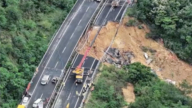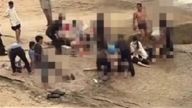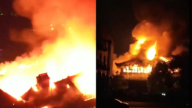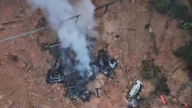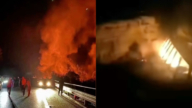【新唐人2013年11月25日訊】「中石化集團公司」在山東青島的輸油管線22號發生爆炸,截至24號13點,當局聲稱死亡人數52人;另外還有11人失蹤、136人受傷,其中10人傷勢嚴重。除此之外,還撤離了1萬8千人。面對慘烈的損失,媒體和民眾要求當局給出事故真相,追究相關人責任。請看報導。
大陸媒體對事故不僅紛紛報導,還翻出了事發管道的老底。
青島當地媒體《半島都市報》早前就有報導指稱,事發的東黃複綫管道,早年就被發現存在安全隱患,而且當年處在「荒郊野外」的管道,當前早已處於繁華市區內,而且管道上方還陸續被佔壓,甚至有不少樓房離管線的距離不足5米。
媒體還披露,東黃複綫管道在2010年5月就發生過管道破裂,跑油240噸的事故。
北京《新京報》對事故則提出了四點質疑:
一、事發輸油管道在兩年前就已隱患重重,輕易進入市政管網是否存在設計缺陷?
二、輸油管線緊挨居民區,當時是如何通過評估的,管線附近居民是否知情?
三、「中石化集團」10月份才剛剛完成全國性的安全大檢查,當時有沒有查出青島輸油管線的事故隱患?
四、原油洩漏大概在凌晨3時左右,爆炸實際上發生在10點30分左右,中間7個半小時,為何沒有進行人員疏散?
《新華社》等中共官媒也追責青島事故原因。
曾任香港《大公報》主筆兼新聞部主任的朱建國指出,青島的事發管道事先就知道處於危險狀態,甚至有人知道了漏油都不敢發到微博上,因為弄不好就會說你是謠言,要被刑拘。
中國政論專欄作家朱建國:「我認為這個事件與當局最近加緊清網、壓制輿論監督,與這個有關。你看三中全會召開前後,發生了一系列重大事故,北京、山西、新疆都出現了重大的死傷事件。」
民眾在網上紛紛表達了自己的憤怒,對事故做出了各種質疑。有的律師甚至建議,青島大爆炸調查,必須首先控制市委書記和市長,否則不可能有真相!
巨大的事故也引起中共高層的震動,事發後中共總書記習近平、總理李克強很快作出了救援批示;24號,習近平還抵達了事發地青島。
不過,多位業內人士在接受《中國網能源頻道》採訪時表示,「原油並非汽油或者柴油易於爆燃,現在又不是夏天氣溫高,油氣混合物如果不是外力介入很難導致爆炸」。
香港《鳳凰網》也質疑,根據青島市官方微博的通報,為甚麼輸油管線破裂地點與爆炸地點不一致?
原中石化工程師修先生:「應該是值得懷疑的。因為正在對中石油、中石化、勝利油田進行這種反腐調查的時候,發生這麼大的爆炸,據說這是中石化歷史上最大的一次爆炸。」
「中石油」系統今年8月末,4名在職高管接連被調查。9月初,剛從「中石油」董事長調任國務院國資委主任、黨委副書記半年的蔣潔敏,也因涉嫌嚴重違紀被免職。而去年6月涉嫌違紀被調查的前四川省人大副主任郭永祥,曾經是蔣潔敏在「勝利油田」的同事。
原在勝利油田工作的修先生認為,隨著蔣潔敏和郭永祥等被抓,被外界稱為「勝利系」的官員坍塌。而且,中共前政治局常委周永康也當過「勝利油田」很長時間的一把手。在這個調查的關鍵時刻,在隸屬於「勝利油田」的山東發生爆炸,比較可疑。
日前香港媒體也指出,中紀委書記王岐山反腐已指向「大人物」,「某退休常委已呼之慾出也」。
這樣看來,在政法系統還殘存影響力的周永康製造出「事故」來,也並非不可能。
採訪/陳漢 編輯/宋風 後製/孫寧
Angry Chinese Seek Truth about Qingdao Explosion
The crude oil pipeline explosion of Sinopec in Qingdao,
Shandong claimed 52 lives.
As of 1pm of the 24th, 11 went missing, there were
136 injuries, of which 10 were serious.
It is reported that 18,000 people were evacuated.
Facing the heavy causalities, media and people ask
for the truth and an investigation.
The following is our report.
While Chinese media outlets are covering the incident,
many have also reported facts about the troubled pipelines.
Qingdao’s local media, Bandao News, reported earlier
that the alleged east yellow pipelines had hidden risks.
Pipelines were built in areas formerly considered
to be wilderness and bustling urbanization soon followed.
Many of the pipes are buried under buildings
with less than a five-meter clearance zone.
These east yellow pipelines reportedly leaked 240 tons
of oil in May of 2010 due to pipeline rupture.
Beijing News had several questions such as, was there
a design flaw in these municipal pipelines since problems
already existed two years ago?
How did these pipelines pass regulations since they are
so close to a residential area?
Were nearby residents made aware of the existence
of these lines?
Were there any problems with Qingdao pipelines during
Sinopec’s October nationwide safety inspection?
The oil spill happened at around 3:00 am,
whereas the explosion occurred at 10:30 am.
Beijing News also questioned why, within the seven
and a half hours, was there no evacuation?
The regime news agencies such as Xinhua News also
questioned who’s being held accountable for the explosion.
Zhu Jianguo, former news director of Hong Kong based
media Ta Kung Pao, indicates that people who were aware
of the risk or were aware of the oil leak would not dare tell
due to the possibility of being charged with spreading rumor.
Zhu Jianguo, political columnist: “I think this incident
is related to Internet censorship and repression of public opinion.
There have been a series of incidents with heavy casualties
such as in Beijing, Shanxi, and Xinjiang since the talk of the Third Plenum."
People have expressed their anger and doubts on the Internet.
There are also lawyers suggesting the only way to find out
the truth is to conduct an investigation
into the municipal party secretary and the mayor.
The explosion also shocked the party leadership.
Both Xi Jinping and Li Keqiang delivered
quick rescue instructions.
Xi Jinping also visited the troubled Qingdao
on the 24th.
According to an Energy.china.com report, specialists
indicated, “Crude oil is not as easy to combust as gas or diesel.
Especially without the heat of summertime, without
external forces, a fuel-air mixture explosion is very unlikely."
Hong Kong based ifeng.com also questioned why the explosion
took place at a different location than the pipeline rupture site.
Mr. Xiu, former engineer of Sinopec: “It is very suspicious.
At the time of anti-corruption, when PetroChina, Sinopec,
and Shengli Oilfield were all being investigated,
this explosion happened.
It is said to be the biggest in Sinopec history."
Four PetroChina executives have been investigated
since late August this year.
Early September, Jiang Jiemin, head of the state security
apparatus was also removed on charges of corruption
during his post as PetroChina executive.
Former deputy director of Sichuan Provincial People’s
Congress Guo Yongxiang, who was once a colleague
of Jiang Jiemin at Shengli Oilfield, was alleged
to have committed serious discipline violations last June.
Mr. Xiu was once an employee of Shengli Oilfield.
He believes that the Shengli Oilfield gang has collapsed
following the fall of Jiang Jiemin and Guo Yongxiang.
The former Politburo standing committee Zhou Yongkang
was also once the head of the Shengli Oilfield.
He suspects a relationship between the Shengli Oilfield
investigation and the explosion in Qingdao,
a Shengli Oilfield affiliate.
Recently Hong Kong media also reported that
the anti-corruption campaign led by the secretary
of the Central Commission for Discipline Inspection,
Wang Qishan, is pointing at a retired Standing Committee.
It is plausible to suspect that Zhou Yongkang,
with his remaining influence in the political and legal system,
could have carried out this explosion.
Interview/ChenHan Edit/SongFeng Post-Production/SunNing




